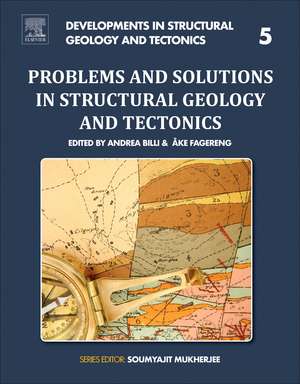Problems and Solutions in Structural Geology and Tectonics: Developments in Structural Geology and Tectonics, cartea 5
Andrea Billi, Ake Fagerengen Limba Engleză Paperback – 6 mar 2019
- Provides practical solutions to industry-related issues, such as well bore stability
- Allows for self-study and includes background information and explanation of research and industry jargon
- Includes full color diagrams to explain 3D issues
Preț: 692.56 lei
Preț vechi: 880.83 lei
-21% Nou
Puncte Express: 1039
Preț estimativ în valută:
132.54€ • 143.92$ • 111.33£
132.54€ • 143.92$ • 111.33£
Carte tipărită la comandă
Livrare economică 15-29 aprilie
Preluare comenzi: 021 569.72.76
Specificații
ISBN-13: 9780128140482
ISBN-10: 0128140488
Pagini: 316
Dimensiuni: 216 x 276 x 21 mm
Greutate: 0.74 kg
Editura: ELSEVIER SCIENCE
Seria Developments in Structural Geology and Tectonics
ISBN-10: 0128140488
Pagini: 316
Dimensiuni: 216 x 276 x 21 mm
Greutate: 0.74 kg
Editura: ELSEVIER SCIENCE
Seria Developments in Structural Geology and Tectonics
Public țintă
Both Graduate and Postgraduate students, and professional geoscientists, especially those who are working on structural geology and tectonics (i.e. petroleum geologists, mining industry professionals, etc.)Cuprins
Integrating Observation and Interpretation to Understand Tectonics, Past and Present
1. Cross-section construction and balancing: examples from the Spanish Pyrenees
2. Techniques for describing the structural geology of cratonic fault and fold zones
3. Using geodesy data in structural geology
4. What do earthquake magnitudes mean? Example of the Kaikoura, New Zealand, 2016 event
Relating Observed Deformation to Stress and/or Strain History
5. Fluid pressure effects on deformation - Analysis of the Lusi Mud Volcano
6. Using Length/Throw ratio to assess the fitness of a fault framework interpretation
7. Pure Shear Kinematics
8. Strain Analysis
9. Unfolding veined fold limbs to deduce a basin’s prefolding state of stress
Observations and Interpretations in Fieldwork and Hand Specimens
10. Recognition of structures in mid-crustal shear zones and how to discern between them
11. Early or late structures in thermogene travertines? Open-air lessons across Rome to focus on and answer this question
12. Characterizing Specimens from the Mid-Atlantic Appalachians in a Wilson Cycle Framework
13. Integrating Structural and Stratigraphic Field Data to Build a Tectonic Model for the Mid-Atlantic Appalachian Orogenic Cycle
Adding Modern Methods to Field Geology
14. From GoogleEarth to 3-D Geology Problem 1: Understanding structures and generating geological maps using GoogleEarth
15. From GoogleEarth to 3-D Geology Problem 2: Seeing below the surface of the Digital Earth
16. Structural interpretation of remote sensing images
Geophysical and Structural Techniques in Petroleum Geoscience and Borehole Projects
17. Understanding reservoir compartmentalization using Shale Gouge Ratio
18. How fault displacement patterns can be applied to investigate trap integrity
19. A numerical study of epithermal neutron log and application of image log
Novel Integration of Mathematical Methods, Computer Science, and Structural Geology
20. Boolean logic in Fluid Flow
21. Using Graph Theory to represent Fracture Networks
22. Synthesis of folds in 3D with Bezier surface
1. Cross-section construction and balancing: examples from the Spanish Pyrenees
2. Techniques for describing the structural geology of cratonic fault and fold zones
3. Using geodesy data in structural geology
4. What do earthquake magnitudes mean? Example of the Kaikoura, New Zealand, 2016 event
Relating Observed Deformation to Stress and/or Strain History
5. Fluid pressure effects on deformation - Analysis of the Lusi Mud Volcano
6. Using Length/Throw ratio to assess the fitness of a fault framework interpretation
7. Pure Shear Kinematics
8. Strain Analysis
9. Unfolding veined fold limbs to deduce a basin’s prefolding state of stress
Observations and Interpretations in Fieldwork and Hand Specimens
10. Recognition of structures in mid-crustal shear zones and how to discern between them
11. Early or late structures in thermogene travertines? Open-air lessons across Rome to focus on and answer this question
12. Characterizing Specimens from the Mid-Atlantic Appalachians in a Wilson Cycle Framework
13. Integrating Structural and Stratigraphic Field Data to Build a Tectonic Model for the Mid-Atlantic Appalachian Orogenic Cycle
Adding Modern Methods to Field Geology
14. From GoogleEarth to 3-D Geology Problem 1: Understanding structures and generating geological maps using GoogleEarth
15. From GoogleEarth to 3-D Geology Problem 2: Seeing below the surface of the Digital Earth
16. Structural interpretation of remote sensing images
Geophysical and Structural Techniques in Petroleum Geoscience and Borehole Projects
17. Understanding reservoir compartmentalization using Shale Gouge Ratio
18. How fault displacement patterns can be applied to investigate trap integrity
19. A numerical study of epithermal neutron log and application of image log
Novel Integration of Mathematical Methods, Computer Science, and Structural Geology
20. Boolean logic in Fluid Flow
21. Using Graph Theory to represent Fracture Networks
22. Synthesis of folds in 3D with Bezier surface
Recenzii
"In short, a commendable work that presents a compendio of varied exercises to get into some of the practical problems associated with structural geology tural and tectonics. The reader will find from theoretical cases to others whose resolution implies solving problems more of interest to society, is to reconstruct how much moves and deforms a region of the earth's surface, assess the significance of the magnitude of an earthquake or reconstruct what shape and characteristics some have structures in the subsoil. In times when we have- We need to encourage our students to understand give the potentiality and practical use of our science, and for society to know and recognize the usefulness of our another profession, this work provides some useful examples for necessary task of training future professionals. As Lynn Fichter and Steven Whitmeyer point out in the book: "all models are wrong, but some of them are useful"." --OTRAS Publication





